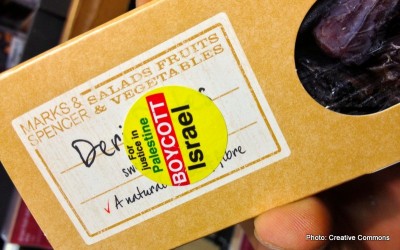UK to Ban Public Bodies from Boycotting Israeli West Bank Goods

Britain’s Conservative government is to announce next week a law that would ban local councils, student unions and other public bodies form boycotting goods for political reasons. The rules are widely seen as meant to protect goods produced by Israeli companies in the occupied West Bank.
The plan to introduce such legislation was first proposed by the Conservative Party at its annual conference in October 2015. Cabinet Office minister Matt Hancock is to formally announce the new regulation during his visit to Israel next week, The Independent reported.
The rules would ban institutions that receive the majority of their funding from the government from participating in procurement political campaigns, choosing not to buy products from companies on political grounds. The only exception would be nationwide boycotts mandated by the government.
London also wants to change the rules for pension investments so that they could not be used for punishing companies for political reasons.
“We need to challenge and prevent these divisive town hall boycotts,” Hancock told The Sunday Times.
“The new guidance on procurement, combined with changes we are making to how pension pots can be invested, will help prevent damaging and counterproductive local foreign policies undermining our national security.”
The new rules are not unlike the restrictions imposed on local councils in 1988 by right-wing Conservative Prime Minister Margaret Thatcher to prevent them from putting economic pressure on the apartheid regime in South Africa by boycotting its goods. The parallel has not passed unnoticed by the opposition Labour Party, which has accused the Tories of imposing their policies on local councils undemocratically.
“This government’s ban would have outlawed council action against apartheid South Africa. Ministers talk about devolution, but in practice they’re imposing Conservative Party policies on elected local councils across the board,” Labour Party leader Jeremy Corbyn said.
He called the ban an attack on local democracy.
This government is almost at the point of rubbing shoulders with fascism.https://t.co/p5fVpzgA1n #DavidCameron #Tories
— Harry Leslie Smith (@Harryslaststand) February 14, 2016
Amnesty International’s UK economic relations program director Peter Frankental said the move could encourage human rights violations.
“Where’s the incentive for companies to ensure there are no human rights violations such as slavery in their supply chains, when public bodies cannot hold them to account by refusing to award them contracts?” he said.
“Not only would it be a bad reflection on public bodies to contract with rogue companies, but it would also be bad for responsible businesses that are at risk of being undercut by those that have poor practices.”
The movement to boycott goods produced in Israeli settlement in the occupied Palestinian territories, the so-called Boycott Divestment Sanctions (BDS) movement, is meant to put pressure on Israel to stop human right abuses against Palestinians. It was first announced in 2005, with Israel vigorously opposing it.
In the UK, Leicester City Council passed a policy to boycott such goods in November 2014. In August 2014, the Scottish government recommended that Scottish local councils joined the boycott, with four of them following the lead.

